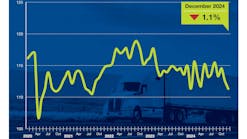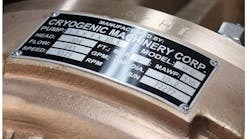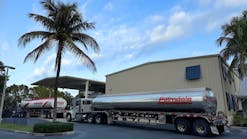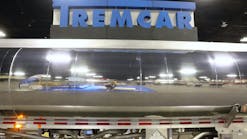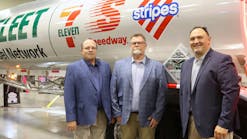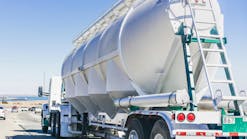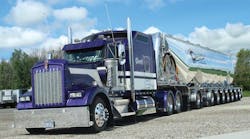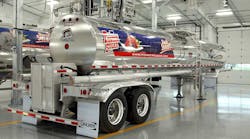Countryside Transportation grows with food hauling, opens three-bay wash rack
SLOWLY and methodically Countryside Transportation Service has grown into a diversified operation with a strong bulk food transport focus. The latest addition to the portfolio of services is a three-bay foodgrade wash rack.
Based in Sebewaing, Michigan, along the shores of Saginaw Bay and Lake Huron, the carrier excels in transporting liquid and dry bulk cargoes that include sugar, molasses, flour, and wheat. The carrier serves customers across the United States and Canada with a fleet that includes 70 tractors and 100 trailers.
Just coming on line is the state-of-the-art foodgrade wash rack at the company’s home location in Sebewaing. In addition to cleaning its own foodgrade trailers, the Countryside Transportation wash rack will offer foodgrade commercial tank cleaning.
Other services offered by the company range from trailer and truck body sales for MAC, truck and trailer maintenance, and parts sales. The company continues to add services as it finds new opportunities.
“We definitely have built a solid reputation as a liquid and dry bulk food hauler,” says Joel Fiebig, co-owner of Countryside Transportation Service. “Located 115 miles north of Detroit (Michigan), we have a close relationship with Michigan Sugar, which processes the sugar beets that are grown in this area. As their primary liquid and dry bulk carrier, we are growing with them.
“At the same time, Countryside is a diversified operation. A big reason for that diversification is that we’re in a rural area where we often need to be self-sufficient. We added services that weren’t available locally, and we found that other local truck and trailer owners also needed those services. We continue to find new opportunities, but we haven’t lost sight of our primary focus as a foodgrade tank truck carrier.”
Family operation
In business since the early 1980s, the family-owned trucking operation began as a gravel hauler. Joel Fiebig’s parents started the company. They made their first move into foodgrade hauling in 1987 when they purchased a dry bulk trailer to haul sugar and changed the company name to Countryside Storage and Transfer.
Countryside Transportation is still very much a family company. “As a family organization, we are committed to furnishing and continually improving on the best transportation service possible for our shippers and their customers,” Fiebig says. “We are a nationwide specialist experienced in all types of freight. We pride ourselves on our high level of excellent customer service as well as reliable delivery of goods when and where our customers want them.”
Fiebig and his sister, Stephanie Adam, bought the company in 2002 and changed the name to Countryside Transportation Service. At the time, the company was running 20 tractors and 30 trailers, most of them dry bulkers. A few dry van trailers handled bagged sugar.
They continued the push into foodgrade hauling while still hauling a variety of other freight. In addition to the dedicated foodgrade equipment, the carrier runs some drop-deck, low-boy, and flatbed trailers, as well as a few end dumps.
“We decided to focus on edible cargoes over gravel, because everybody has to eat,” Adam says. “We added liquid foodgrade cargoes—primarily sugar—four years ago.”
Steady expansion
Meeting customer needs has brought steady expansion and diversification. From the start, Countryside Transportation had in-house tractor and trailer maintenance capabilities. That operation has grown significantly over the years.
“We’ve always believed it was critical to maintain our own fleet,” Fiebig says. “However, we also found that other truck owners in our area needed local maintenance services. Today, Countryside Transportation has a nine-bay service shop fully equipped to service a customer’s mechanical needs. The shop is staffed with ASE certified mechanics and the latest equipment.
“Our technicians can handle any operation from engine overhaul, transmission, front end, rear axle, frame, oil change and grease, and air conditioning. Our trailer experience is second to none. With 100 of our own trailers we are well versed in trailer maintenance and repair, from springs and brakes to axle work and alignments.”
In 2006, the company opened Countryside Sales & Service retail parts store, specializing in new and used truck and trailer parts. In 2015, the company became a full-line stocking MAC Trailer dealer.
“The parts sales operation has become a real winner,” Fiebig says. “We stock what the local market needs, and our parts sales are growing steadily. Becoming a MAC dealer was the next step in serving the local market. We’re selling a lot of specialty equipment.”
Better cleaning
Up until recently, one-bay at the far end of the maintenance shop was dedicated to in-house foodgrade tank cleaning. That single wash bay could clean only two to three trailers a day.
All of that has now changed. Countryside Transportation’s new foodgrade wash rack is truly state of the art. Occupying three bays in a newly constructed 22,500-sq-ft building at the Sebewaing terminal, the wash rack can clean upwards of 20 foodgrade tank trailers a day. Two shifts keep the wash rack running 10 hours a day Monday through Friday.
The Kosher-certified wash rack was designed in anticipation of more stringent Food and Drug Administration food transport regulations. It has the largest Peacock single-pass wash unit on the market with a 4.5 million Btu capability and can clean two trailers at a time. The peacock unit can generate steam as well as hot water.
All of the tank cleaning currently is done with 180°F hot water. However, Countryside Transportation has already installed a system for chemical sanitizing should that be needed in the future.
The wash rack includes a Carbis galvanized steel work platform with fall protection on the drop-down ramps that provide access to trailers being cleaned. Additional fall protection is linked to steel cables running the length of each wash bay. Compressed air and pressure-washer hose are kept off the floor on Hannay reels.
A notable feature in the wash rack is a geo-thermal system that provides heating and cooling to ensure comfortable work conditions. An in-floor heating system keeps the floors relatively dry.
Busy fleet
The carrier hauls sugar loads across the United States and Canada with trips averaging 300 miles. Most of the return trips are empty. Liquid and dry bulk sugar shipments are delivered to some of the top bakery brands in the industry.
“We do a lot of regional work, but we also have quite a few long distance runs,” Adam says. “We go where our customers need us to go.”
For efficiency, the carrier runs across Canada when transporting sugar from Michigan to western New York and other destinations in the Northeast. “We have 20 loads a week going to the northeast, and we save three hours each way with the shortcut across Canada,” Adam says.
Productivity also means running big 11-axle Michigan combinations within Michigan. With a maximum gross combination weight capability, these rigs enable payloads up to 110,000 pounds. In Canada, the carrier runs some four-axle trailers with a 70,000-lb payload capacity.
Company drivers
All of the equipment is operated by company drivers. The carrier currently employs 65 full-time company drivers and 10 who work part time.
“We also employ only the best qualified drivers, and we have very low turnover,” Adam says. “Our drivers are equipped with years of practical over-the-road experience, transporting a full range of shipments. We offer good benefits and provide good, reliable equipment.”
To be hired, a driver must have at least three years of over-the road truck driving experience and a good driving record and work history. Most of the drivers live in the Sebewaing area.
Typically, a driver will leave Sunday night and return home on Friday, but some drivers stay out two to three weeks at a stretch. Sugar trailers are loaded by the shippers, and Countryside Transportation is moving to more pre-loaded, staged trailers. “We’re expanding the pre-loading effort over the next year to reduce the impact on driver hours of service,” Adam says.
Fleet equipment
Drivers are assigned to tractors that present a customized image. “We do a lot to dress up our fleet, and most of that work is done in our own maintenance shop,” Fiebig says. “Our mechanics can fabricate and install customized accessory lighting, visors, fenders, and exhaust stacks.”
The carrier runs a variety of Kenworth heavy-duty tractor models and most are sleeper units. The newest ones have 60- or 86-inch sleepers.
Teletrac Navman on-board tablet computers have been installed throughout the fleet. The system has been configured for electronic driver logs but hasn’t yet been activated.
Currently, the carrier is specifying Cummins ISX15 engines and Eaton Fuller 10- and 13-speed transmissions. Electrical power for the sleeper is provided by a Bergstrom Nite no-idle system. Sleepers are warmed by Espar heaters.
Product handling hardware includes Gardner Denver and Tuthill blowers powered by a direct-drive Chelsea PTO.
SAF Holland aluminum fifthwheels help lower tare weight. The carrier runs Michelin X One widebase tires in the drive positions and Alcoa Dura Brite aluminum wheels. Some tractors have been specified with tire inflation management systems. Tractors and trailers are being ordered with air disc brakes.
“We believe air disc brakes provide longer life, easier maintenance, and faster stopping performance,” Fiebig says.
The carrier runs J&L Tank and MAC Trailer dry bulkers. Foodgrade stainless steel tank trailers have come from MAC LTT and Walker Stainless. BTI hardware is standard on all new dry bulkers.
Trailer specs include Air Weigh LoadMaax on-board scales, Grote and Truck-Lite lighting, and Jost landing gear. Hendrickson Intraax air suspensions include lifting axles to reduce rolling resistance when trailers are empty. The Hendrickson system also has the Tiremaax Pro tire inflation system. ♦


